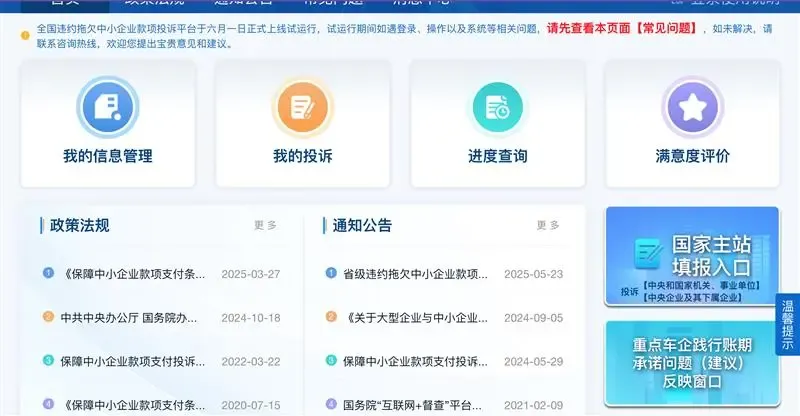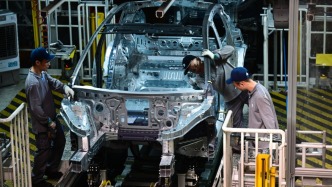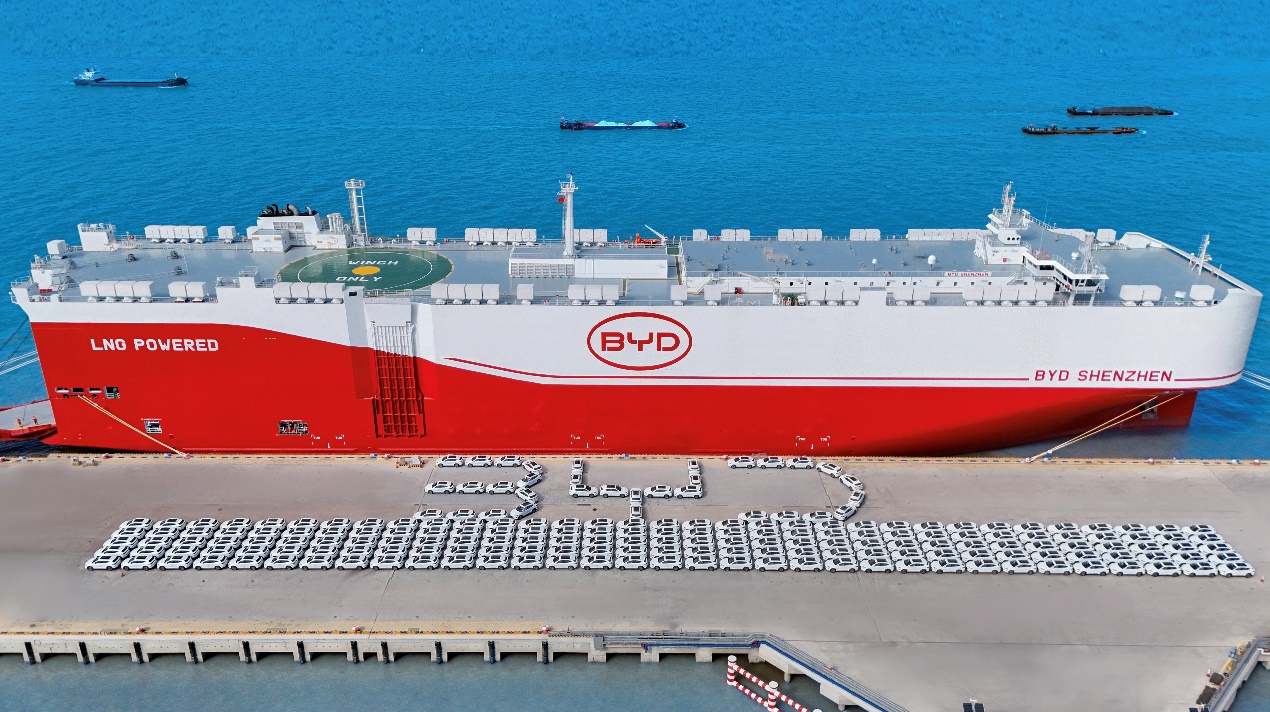
On July 9, 2025, the Ministry of Industry and Information Technology opened the "Online Problem Reporting Window for Key Automobile Enterprises to Implement Payment Period Commitments" (hereinafter referred to as the "Window") to accept reports from small and medium-sized enterprises regarding key automobile enterprises' failure to implement their payment period commitments and the "Regulations on Guaranteeing the Payment of Funds to Small and Medium-sized Enterprises."

In the notice issued by the Ministry of Industry and Information Technology, a total of 17 key automobile companies including Geely, Great Wall, BYD, Chery, GAC, FAW, Dongfeng, SERES, SAIC, Xpeng, Xiaomi, Great Wall, Leapmotor, Li Auto, BAIC, JAC, and NIO have made a commitment that "payment period will not exceed 60 days."

The page shows that the window mainly handles four types of issues: First, key automakers fail to fulfill their commitment to a 60-day payment period, and the payment period agreed in the purchase contract exceeds 60 days; second, key automakers set unreasonable payment period start times, delay issuing inspection or acceptance certificates without justifiable reasons, and extend the payment period in disguise, as well as use receipt of third-party payments as a payment condition or pay according to the third-party payment ratio; third, key automakers force or covertly force small and medium-sized enterprises to accept non-cash payment methods such as commercial bills and electronic vouchers for accounts receivable; fourth, other issues related to key automakers' failure to implement the Regulations on Guaranteeing the Payment of Funds to Small and Medium-sized Enterprises.
For the automobile industry, where payment period issues are particularly prominent, this digital rights protection channel built by the Ministry of Industry and Information Technology is becoming a "sword of Damocles" hanging over the head of the automobile industry.
The chaotic payment period of auto companies has ushered in a "heavy blow"
The long-standing problem of overdue payments in the automotive industry has become a major bottleneck restricting the healthy development of the industry. According to the survey data of the China Association of Automobile Manufacturers in 2024, the average payment period of vehicle manufacturers reached 170 days, and some companies even reached more than 240 days, far exceeding the internationally accepted standard of 60-90 days.
In the industry, vehicle manufacturers, relying on their dominant position in the industry chain, often pass on operating pressure by extending payment terms. This game rule of "big fish eat small fish" has always been in a "default" state, but it may face unprecedented challenges after the complaint platform goes online.
The revised Regulations on Ensuring Payment of Small and Medium Enterprises clearly stipulate that large enterprises must complete payment within 60 days of purchase, and cannot extend the payment period in disguise for any reason. This regulation directly hits the pain point of the automotive industry.
According to the 2024 Corporate Financial Report of the Ministry of Finance, the average account payable of major domestic listed auto companies reached 35% of their revenue, among which BYD, Great Wall Motors and other companies had an account payable turnover period of more than 200 days. According to statistics from relevant institutions, the cumulative account payable scale of the 12 auto companies counted exceeded 1.1 trillion yuan, among which BYD, SAIC Group and Geely Holding ranked the top three, with account payable scales of 244 billion yuan, 241.1 billion yuan and 182.4 billion yuan respectively.
In terms of the proportion of accounts payable to revenue, the average value of the 12 automakers exceeded 40%. Except for GAC Group, the other 11 automakers all exceeded 30%. Among them, Chery, Changan, SERES, NIO, and BAIC BluePark's accounts payable accounted for about 50% of their revenue.
The long payment period of automobile enterprises has a great impact on the operation of upstream suppliers. Previously, the China Iron and Steel Association mentioned in a document that the automobile industry is the main steel-using industry in the steel industry. Automobile enterprises "roll up" prices, and upstream raw material suppliers feel pressure. Steel enterprises feel the same way, which has seriously impacted the stable operation of enterprises. The Iron and Steel Association undoubtedly speaks out the "voice" of the upstream and downstream supply chains, and the difficulties they face are just a microcosm of the dilemma of the supply chain.
This time, the official launch of the "window" will undoubtedly ease the financial pressure on suppliers, but on the other hand, it will also increase the cash flow pressure on car companies.
Industry insiders commented: "For car companies such as BYD, Geely, and Great Wall, which have a lot of accounts payable, long payment cycles, and a high proportion of supply chain finance, it will not be a major blow, but for car companies that already have tight capital chains and difficulty in financing, they may face more severe capital chain challenges."

Suppliers' capital chain may be "loosened"
In recent years, the domestic automobile industry has maintained a high-speed growth trend. According to the data from the China Association of Automobile Manufacturers, from January to May this year, automobile production and sales reached 12.826 million and 12.748 million respectively, up 12.7% and 10.9% year-on-year respectively.
While the scale of production and sales continues to expand, the "involution" phenomenon in the automotive industry continues to intensify. The shadow of "price war" always hangs over the heads of automakers and their upstream and downstream companies. For auto parts companies that have been in a weak position for a long time, such a shadow is "too heavy to breathe."
A survey by the China Society of Automotive Engineers shows that the average accounts receivable turnover days in the auto parts industry will be as high as 136 days in 2024, and the capital cost will account for more than 15% of operating income, seriously eroding corporate profits.
The launch of this "window" is undoubtedly a timely relief for the supply chain of auto companies. The industry generally believes that the combination of policy + complaint platform can play a positive role in optimizing the ecology of the automotive industry chain and improving the cash flow of some parts companies to a certain extent. For suppliers, it is helpful for companies to improve capital turnover efficiency to a certain extent.
The more far-reaching impact is that this change is reshaping the competition logic of the entire automotive industry. When the credit period bonus disappears, automakers have to shift their attention from "how to squeeze suppliers" to "how to improve operational efficiency."
Experts from the China Automobile Dealers Association pointed out that the launch of the "window" may accelerate the reshuffle of the industry. Companies that have long relied on overdue accounts to maintain cash flow will face severe challenges, while companies that focus on technological innovation and efficiency improvement will gain greater room for development.
The launch of the "window" indicates that China's automobile industry is undergoing a profound transformation. A relevant person in charge of the Ministry of Industry and Information Technology said that the opening of the "online problem (suggestion) reporting window for key auto companies to implement their payment commitments" is aimed at accepting suggestions on issues related to small and medium-sized enterprises, promoting key auto companies to improve management processes and optimize payment methods, and implementing the "Regulations on Guaranteeing Payment of Small and Medium-sized Enterprises" to effectively implement payment commitments and benefit the majority of small and medium-sized enterprises.
In the next step, the Ministry of Industry and Information Technology will also guide industry organizations to study and formulate settlement and payment standards for the automobile industry, promote contract templates, further standardize the payment process for automobile companies' suppliers, promote the construction of a "complete vehicle-parts" collaborative and win-win development ecosystem, and promote the healthy and sustainable development of the automobile industry.
(Original title: "Industry | Evergrande is about to show up in the automotive industry? The Ministry of Industry and Information Technology has opened a window for key auto companies to reflect their fulfillment of their account period commitments")


